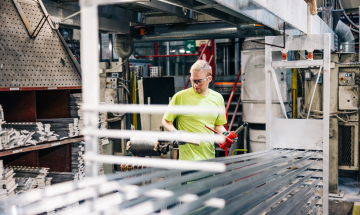Technology industry turnover continues to grow, but growth of new orders and tender requests has stalled
According to the Federation of Finnish Technology Industries’ recent survey of order books, the monetary value of new orders between July and September was at the same level as in the preceding quarter. Without a significant new ship order, the value of new orders would have taken a downward turn. Year-on-year, orders were up 22 per cent. The increase is mostly due to a drop in the comparison period in 2017.
At the end of September, the value of order books was 6 per cent higher than in June and 20 per cent higher than in the corresponding period in 2017. It is worth noting that more than 60 per cent of the strengthening of the order books since 2014 is attributable to ship orders.
The turnover of technology industry companies in Finland was up 5 per cent year-on-year in the January-July period. Slight growth is expected for the rest of the year, too. About half of the turnover growth has been attributable to volume growth and half to the rising world market prices of raw materials and components.
This Economic Outlook report also contains information about the profitability of the member companies of the Federation of Finnish Technology Industries. According to the preliminary data collected by Statistics Finland, the profitability of the member companies improved somewhat during 2017. Nevertheless, half of the companies continue to either report losses or perform poorly on profitability.
Employment is rising dramatically
Strong order books have given a massive boost to employment in the industry. At the end of September, technology industry companies employed 314,000 people, almost 15,000 more than the 2017 average.
By the end of September, companies had recruited 40,000 new employees, while in 2017, recruitments came to 42,500 in total. Sixty-seven per cent of these employees were hired by SMEs. Some companies were increasing their personnel, others were hiring new employees due to retirements and employee turnover.
Skill shortages require immediate action
According to the CEO of the Federation of Finnish Technology Industries, Jaakko Hirvola, the industry outlook is both encouraging and discouraging. It is encouraging to see technology companies recruit even more people than estimated in the spring.
At the time, the companies estimated that, in total, their personnel would expand by 27,000 between 2018 and 2021, which means around 7,000 new employees each year. This figure does not include employees hired due to retirements and employee turnover. In drawing up the estimates, account was taken of the expected slowdown of economic growth.
“Personnel has already increased by almost 15,000, which means that we have to take skill shortages extremely seriously. Education must be able to provide the required skills at all levels so that skill shortages do not become an increasingly large barrier to growth. Labour immigration and learning to be multicultural must become a national project, because we do not have enough people to meet the need for skills. It is important to remove the needs test and speed up the permit granting processes,” Hirvola points out.
According to Hirvola, the high proportion of loss-making and weakly performing companies indicates that productivity is not improving at the rate required. Finland needs more investment, innovation and world-class research. It is alarming to see that offshoring of RDI functions and research brain drain are on the increase. We need skills and re-invention to improve productivity, create new business and give a boost to economic growth, which is expected to slow down.
“We should set an objective of establishing strong business-driven innovation ecosystems capable of creating new business to the value of EUR 20 billion by 2025. It is a basic fact that we need to look after the competitiveness of business and our society as a whole. Integral to this, the investments we need should not be delayed for years because they are waiting for permissions,” Hirvola says, sending a signal to the political decision-makers.
Industrial peace is necessary
Director, Labour Market, Minna Helle, calls for industrial peace. After several weeks of political industrial action, it is time to bring it to an end, simply because it is too costly, and has been for quite some time. Helle hopes that current talks lead to an immediate solution.
“The industrial action has borne heavily on many companies and has also complicated people’s everyday lives. Should the situation become worse, the crisis will have a negative effect on the economic figures for the autumn,” Helle points out.
“The labour market has a significant impact on productivity, competitiveness and Finland’s performance. The focus should be on improving productivity and finding future success factors. We can ill afford any labour market crises. We must be able to maintain industrial peace during agreement periods,” Helle emphasises.
Further information:
Jaakko Hirvola, CEO, phone +358 (0)40 063 3751
Jukka Palokangas, Chief Economist, phone +358 (0)40 750 5469
Minna Helle, Director, Labour Market, phone +358 (0)40 341 4884


